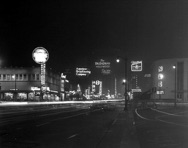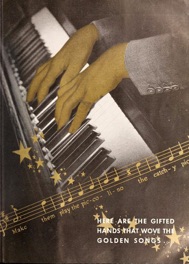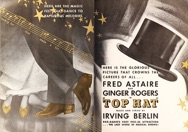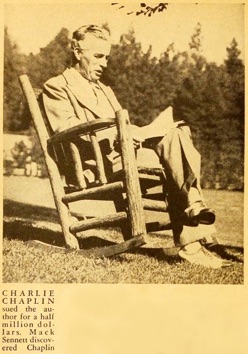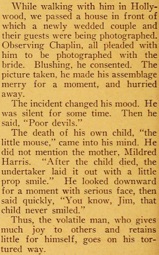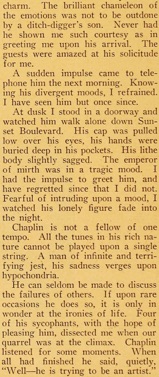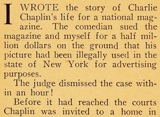Modern Times 1935 1936 1937 next previous
Modern Times Clippings 139/382
Jim Tully, Motion Picture, New York, April 1935.
Looking north on Vine Street toward Sunset
and Vine, curved one-arm electrollers light the intersection,
Los Angeles 1950s, Water and Power
& Make them play the pic-co-li-no
the catch-y pic-co-li-no
HERE ARE THE GIFTED HANDS THAT WOVE
THE GOLDEN SONGS.
(...) FRED ASTAIRE and GINGER ROGERS in Top Hat
Music and Lyrics by IRVING BERLIN
(...) Ad, Motion Picture Herald, Aug. 3, 1935
& Catch-y hit that made a hit and
HERE ARE THE MAGIC FEET THAT DANCE
TO RAPTUROUS MELODIES.
(...) FRED ASTAIRE and GINGER ROGERS in Top Hat
Music and Lyrics by IRVING BERLIN
(...) Ad, Motion Picture Herald, Aug. 3, 1935
& Charlie Chaplin sued the author for a half million dollars.
(...) Photo, Motion Picture, March 1935
& Hollywood biographer JIM TULLY is feared as well as loved.
(...) Photo, Motion Picture, March 1935
My Neighbors
By Jim Tully
The Crooner, the Clown, the Master of Comedies,
and the greatest of all Comedians bow to the
pen of the renegade of the road, the picturesque Jim Tully.
„Watched him walk alone down Sunset Boulevard“
Editorial content. „My Neighbors
By Jim Tully“ (...)
„I wrote the story of Charlie Chaplin‘s life for
a national magazine. The comedian sued the magazine and
myself for a half million dollars on the ground that
his picture had been illegally used in the state of New York
for advertising purposes.
The judge dismissed the case within an hour!
Before it had reached the courts Chaplin
was invited to a home in which I was a guest. While reluctant
to meet the great comedian at the time, I realized
that I was but a social kitten and made way for the lion.
The lad from the streets of London was the
Talleyrand of charm. The brilliant chameleon of the emotions
was not to be outdone by a ditch-digger‘s son. Never
had he shown me such courtesy as in greeting me upon his
arrival. The guests were amazed at his solicitude
for me.
A sudden impulse came to telephone him the
next morning. Knowing his divergent moods, I refrained.
I have seen him but once since.
At dusk I stood in a doorway and watched him walk alone
down Sunset Boulevard. His cap was pulled low over
his eyes, his hands were buried deep in his pockets. His lithe
body slightly sagged. The emperor of mirth was
in a tragic mood. I had the impulse to greet him, and have
regretted since that I did not. Fearful of intruding
upon a mood, I watched his lonely figure fade into the night.
Chaplin is not a fellow of one tempo. All the
tunes in his rich nature cannot be played upon a single string.
A man of infinite and terrifying jest,
his sadness verges upon hypochondria.
He can seldom be made to discuss the failure
of others. If upon rare occasions he does
so, it is only in wonder at the ironies of life. Four of his
sycophants, with the hope of pleasing him,
dissected me when our quarrel was at the climax. Chaplin
listened for some moments. When all had
finished he said, quietly, ,Well – he is trying to be
an artist.‘
While walking with him in Hollywood, we passed
a house in front of which a newly wedded
couple and their guests were being photographed.
Observing Chaplin, all pleaded with
him to be photographed with the bride. Blushing,
he consented. The picture taken, he made
his assemblage merry for a moment, and hurried away.
The incident changed his mood.
He was silent for some time. Then he said,
,Poor devils.‘
The death of his own child, ,the little mouse,‘
came into his mind. He did not mention
the mother, Mildred Harris. ,After the child died, the undertaker
laid it out with a little prop smile.‘ He looked downward
for a moment with serious face, then said quickly, ,You know,
Jim, that child never smiled.‘
Thus, the volatile man, who gives much joy to others and
retains little for himself, goes on his tortured way.“ (...)
Redaktioneller Inhalt
Modern Times 1935 1936 1937 next previous


